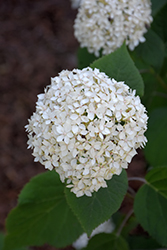It's all about ...
plants

Seaside Serenade® Bar Harbor Hydrangea
Hydrangea arborescens 'SMHAMWM'
Height: 4 feet
Spread: 4 feet
Sunlight:
![]()
![]()
Hardiness Zone: 3a
Group/Class: Seaside Serenade Series
Brand: Monrovia
Description:
A hardy, showy, compact form that is perfect for smaller spaces; features big, ball-shaped white flower heads in mid summer on straight, sturdy stems that hold up even in heavy rain; ideal for borders and containers; blooms on new growth
Ornamental Features
Seaside Serenade® Bar Harbor Hydrangea features bold balls of white flowers at the ends of the branches from mid to late summer. The flowers are excellent for cutting. It has forest green deciduous foliage. The heart-shaped leaves do not develop any appreciable fall colour.
Landscape Attributes
Seaside Serenade® Bar Harbor Hydrangea is a multi-stemmed deciduous shrub with a more or less rounded form. Its strikingly bold and coarse texture can be very effective in a balanced landscape composition.
This shrub will require occasional maintenance and upkeep, and is best pruned in late winter once the threat of extreme cold has passed. It has no significant negative characteristics.
Seaside Serenade® Bar Harbor Hydrangea is recommended for the following landscape applications;
- Mass Planting
- General Garden Use
Planting & Growing
Seaside Serenade® Bar Harbor Hydrangea will grow to be about 4 feet tall at maturity, with a spread of 4 feet. It tends to be a little leggy, with a typical clearance of 1 foot from the ground. It grows at a fast rate, and under ideal conditions can be expected to live for approximately 20 years.
This shrub does best in full sun to partial shade. You may want to keep it away from hot, dry locations that receive direct afternoon sun or which get reflected sunlight, such as against the south side of a white wall. It prefers to grow in average to moist conditions, and shouldn't be allowed to dry out. It is not particular as to soil type or pH. It is highly tolerant of urban pollution and will even thrive in inner city environments. Consider applying a thick mulch around the root zone in winter to protect it in exposed locations or colder microclimates. This is a selection of a native North American species.
